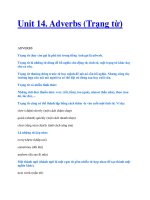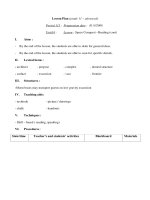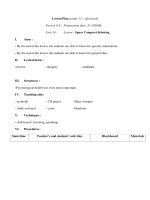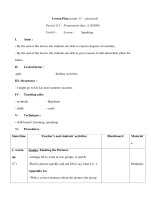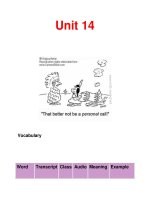Unit 14 time clauses
Bạn đang xem bản rút gọn của tài liệu. Xem và tải ngay bản đầy đủ của tài liệu tại đây (86.21 KB, 2 trang )
Time Clauses
Using Before, After, While and When
The Grammar
Independent clause
Dependent clause
The phone rang
before we ate dinner.
The phone rang is an independent clause. It can stand alone grammatically.
before we ate dinner is a dependent clause. It needs an independent clause to be a
complete sentence. It is a sentence fragment when it is used alone.
Punctuation
The phone rang before we ate dinner.
Before we ate dinner, the phone rang.
When the independent clause comes first in the sentence, no comma is needed.
When the dependent clause comes first in the sentence, the clauses are separated
by a comma.
Different verb tenses
Look at these verb tenses:
two past tense
It started to rain before I got home.
events
Jaime had a drink before he played tennis.
modal
I have to get home before it starts of rain.
auxiliary and
present tense
Jaime has to have a drink before he plays tennis.
two past tense Henry went to the movie after he had dinner
events
Prof. Simon gave a test after the spring break
ended.
modal
Henry may go to the movie after he has dinner.
auxiliary and
present tense
Secretary Simon ought to negotiate with the rebels
Nguyen Trung Kien – BoE/BoFEs
Center for Languages for Specific Purposes and Translation
College of Foreign Languages – V.N.U, Hanoi 2006
1
Time Clauses
Using Before, After, While and When
before the situation gets out of hand.
an on-going
event
Myra was reading a book when the phone rang.
interrupted by
a single event in
the past
past tense cause
Myra had to get up when the phone rang.
and effect
two past tense Ben asked for a ride when Myra answered the
events
phone.
two future
events
Myra will leave to pick up Ben when she hangs
up.
two past tense
I was listening carefully while the manager was
continuous
explaining the problem.
activities
one past tense
continuous
event
The doorbell rang while I was taking a shower.
interrupted by
single action
Cause and Effect
You can use when or after to explain some cause and effect situations.
Effect: He got a flat tire (puncture).
Cause: He ran over some glass.
He got a flat tire after he ran over some
glass.
After he ran over some glass, he got a flat
tire.
Cause: It rained.
Effect: Our paint job was ruined.
When it rained, our paint job was ruined.
Our paint job was ruined when it rained.
Nguyen Trung Kien – BoE/BoFEs
Center for Languages for Specific Purposes and Translation
College of Foreign Languages – V.N.U, Hanoi 2006
2


